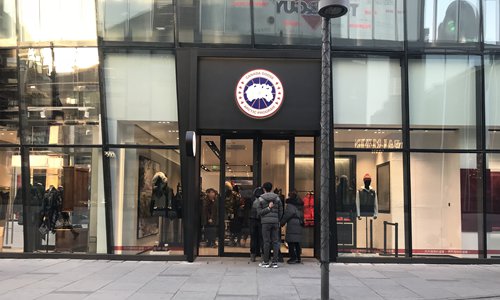Not cooked Canada Goose expects expansion in China, yet Huawei case still a thorn

Consumers walk into a Canada Goose store in Beijing on February 11. Photo: VCG
Canada Goose, the Canadian luxury winter jacket maker, may have achieved great results in its most recent fiscal quarter, but it might not be time for a celebration yet. The company still faces a backlash in China due to the lingering dispute over the arrest of the Huawei CFO in Canada.
While sales in China appear not to have been affected yet, persistent calls for a boycott of the brand could turn into action if the Huawei case is not properly resolved and further angers Chinese consumers.
Earnings for the third quarter of fiscal 2019, which ended on December 31, 2018, were released on Thursday.
In its earnings statement, Canada Goose said its gross profit margin in the direct-to-consumer business, which includes online stores and company-owned retail outlets, was 76.1 percent, compared with 76.5 percent a year earlier.
The better-than-expected report also showed the company's strong willingness to expand its business in the Chinese market.
"We leave politics to the politicians," Canada Goose CEO Dani Reiss was quoted as saying in an interview on Thursday. "We're really happy with our Chinese business plan and the way we plan to approach it. It's been executed really well," Reiss said, according to a Bloomberg report on Friday.
Reiss said the cooperation with Alibaba's online Tmall has proven the "right way" to sell his coats to Chinese shoppers.
During the 2018 Singles' Shopping Festival on November 11, Canada Goose's transaction volume on its Tmall flagship store was 10 million yuan ($1.45 million) within about one hour after sales kicked off.
But the Toronto-based coat maker has encountered a backlash from Chinese websites and social media, where netizens have called for a boycott of the brand after Huawei CFO Meng Wanzhou was arrested in Canada in early December last year.
Those calls have not faded as Meng's case remains a focal point in the China-Canada relationship.
A Beijing-based white-collar worker surnamed Shen told the Global Times on Monday that she had wanted to buy a Canada Goose parka, the most popular product for the brand, this winter but dropped the idea after the company's earnings release.
"I think the company should not hold such a high profile at this moment in the Chinese market as the Huawei case is not resolved yet," Shen noted, adding such a gesture by Canada Goose might lose a potential consumer like her who has begun to feel an aversion to the brand.
Some have also warned that they might move to boycott Canadian products if Meng's case was not addressed "properly."
A hearing for Meng is scheduled in Vancouver on March 6. The US is seeking Meng's extradition and Canada will weigh whether to issue an "Authority to Proceed," a step that will provide the official go-ahead to begin hearing arguments for and against extradition by March 1, according to a CNBC report on February 11.
The political impact on market sentiment should be seriously considered in the long run for investors in Canada Goose, as it will affect the company's growth in the country, Gao Tuo, head of research at Shanghai-based ChaseStone Capital, told the Global Times on Monday.
"As far as I am concerned, the company's performance in China is not likely to be affected by political tensions in the long run because China-Canada diplomatic relations are poised to normalize amid the easing of China-US trade friction," said Gao. "But it still waits to see how the Huawei case will be resolved by the Canadian side."
However, there are some consumers who are not concerned about the political factors. A Beijing consumer surnamed Jia, aged 35, told the Global Times on Monday that she bought a Canada Goose parka via a relative based in Vancouver this winter.
"I only care about the product. I chose the low-profile black label instead of the 'ubiquitous' normal blue-and-white one because the latter is so frequently seen on the street. I don't want to show the label since the Huawei CFO's arrest case still involves uncertainty," Jia said.

